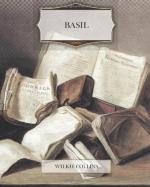Directing my characters and my story, then, towards the light of Reality wherever I could find it, I have not hesitated to violate some of the conventionalities of sentimental fiction. For instance, the first love-meeting of two of the personages in this book, occurs (where the real love-meeting from which it is drawn, occurred) in the very last place and under the very last circumstances which the artifices of sentimental writing would sanction. Will my lovers excite ridicule instead of interest, because I have truly represented them as seeing each other where hundreds of other lovers have first seen each other, as hundreds of people will readily admit when they read the passage to which I refer? I am sanguine enough to think not.
So again, in certain parts of this book where I have attempted to excite the suspense or pity of the reader, I have admitted as perfectly fit accessories to the scene the most ordinary street-sounds that could be heard, and the most ordinary street-events that could occur, at the time and in the place represented—believing that by adding to truth, they were adding to tragedy—adding by all the force of fair contrast—adding as no artifices of mere writing possibly could add, let them be ever so cunningly introduced by ever so crafty a hand.
Allow me to dwell a moment longer on the story which these pages contain.
Believing that the Novel and the Play are twin-sisters in the family of Fiction; that the one is a drama narrated, as the other is a drama acted; and that all the strong and deep emotions which the Play-writer is privileged to excite, the Novel-writer is privileged to excite also, I have not thought it either politic or necessary, while adhering to realities, to adhere to every-day realities only. In other words, I have not stooped so low as to assure myself of the reader’s belief in the probability of my story, by never once calling on him for the exercise of his faith. Those extraordinary accidents and events which happen to few men, seemed to me to be as legitimate materials for fiction to work with—when there was a good object in using them—as the ordinary accidents and events which may, and do, happen to us all. By appealing to genuine sources of interest within the reader’s own experience, I could certainly gain his attention to begin with; but it would be only by appealing to other sources (as genuine in their way) beyond his own experience, that I could hope to fix his interest and excite his suspense, to occupy his deeper feelings, or to stir his nobler thoughts.
In writing thus—briefly and very generally—(for I must not delay you too long from the story), I can but repeat, though I hope almost unnecessarily, that I am now only speaking of what I have tried to do. Between the purpose hinted at here, and the execution of that purpose contained in the succeeding pages, lies the broad line of separation which distinguishes between the will and the deed. How far I may fall short of another man’s standard, remains to be discovered. How far I have fallen short of my own, I know painfully well.




